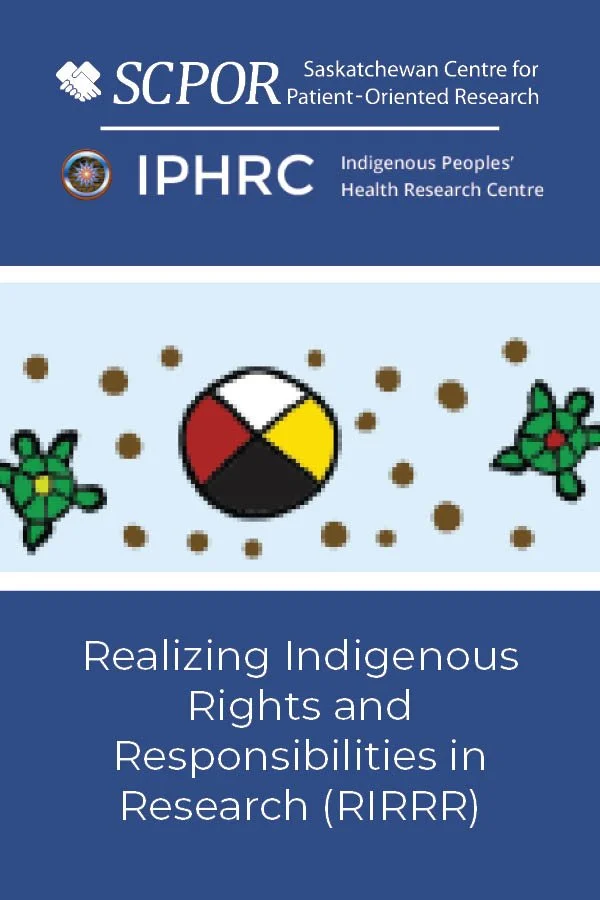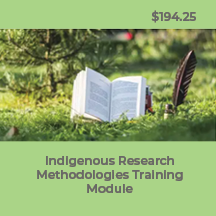
Knowledge and Learning
SCPOR’s Indigenous Research and Engagement team provides training on a variety of topics. These courses are recommended for anyone conducting research, but specifically for those engaging in research with Indigenous communities and individuals.
Several of our courses are available online and in-person sessions can be arranged.
Building Research Relationships with Indigenous Communities (BRRIC)
Building Research Relationships with Indigenous Communities (BRRIC) aims to disseminate knowledge among academic stakeholders for engaging in transformative Indigenous research utilizing best practices and methods for producing results and findings that benefit all parties involved.
BRRIC offers a diverse array of essential information covering issues such as the history of Indigenous health and research in Saskatchewan, existing policies and frameworks guiding research with Indigenous communities such as OCAP®, Truth and Reconciliation Commission calls to Action, Tri-Council Policy Statement Chapter 9, and protocol on how to respectfully and meaningfully engage Indigenous communities in research projects.
$367.50 | 3-4 hours online (15 lessons within 3 modules)
Realizing Indigenous Rights and Responsibilities in Research (RIRRR)
Realizing Indigenous Rights and Responsibilities in Research aims to educate, inform, and promote Indigenous self-determination when engaging with researchers and research project from outside of the community. Within the RIRR module, you will gain an understanding of the role of colonialism as a determinant of Indigenous health, the history of health research and Indigenous communities and gain a stronger understanding of the research industry. You’ll get access to frameworks that can be used to guide and govern Indigenous research in a good way and learn how to exercise rights and self-determination as Indigenous Peoples and Communities when engaging in research.
Who should take RIRRR Training?
RIRRR was designed to benefit band administrative staff and councils, Metis governments, Indigenous community-based organizations, research staff, Patient Partners, students and any individual or organization seeking to engage in Indigenous community-based research or patient-oriented research
Indigenous Research Methodologies (IRM)
The Indigenous Research Methodologies (IRM) course aims to build on previously cultivated knowledge after the completion of the Building Research Relationships with Indigenous Communities (BRRIC) training module. IRM provides guidance and knowledge to academic stakeholders about the historic relationship between Indigenous communities and Western education through research, policy, and planning. Learners will be educated about Indigenous research methodologies and how they are used in present day research, as well as how they could be used in the future.
Pre-requisite: BRRIC Training Module
$185.00 + GST | 3 hours online
Indigenous Data Sovereignty (IDS)
The IDS course is currently in development and will be available soon.
Indigenous Research Level of Engagement Tool (IRLET)
The Indigenous Research Level of Engagement Tool (IRLET) aims to provide guidance to researchers and grant review committees who are involved in or are new to Indigenous research with guidelines on how to ensure a project proposal is being planned and executed in an appropriate manner.
The IRLET Training Module offers guidance on a number of categories for researchers and reviewers to consider when shaping or reviewing a research project proposal. Categories that the IRLET encourages its users to consider are partnership with Indigenous stakeholder(s), knowledge into practice, strengths-based approaches, Indigenous knowledges and ways of knowing.
Patient & Indigenous Research Level of Engagement Tool (PaIRLET)
The Patient and Indigenous Research Level of Engagement Tool (PAIRLET)measures the degree to which a given project meets patient-oriented research criteria in the context of Indigenous communities. The criteria evaluated in this tool include Partnership (Indigenous Stakeholders), Knowledge into Practice, Strengths-Based Approach, Indigenous Knowledges/Ways of Knowing and Patient-Oriented, rated on a scale from 1 to 5.
Users of the PaIRLET will find it helpful to review the IRLET Companion Document when scoring incoming projects, or while using it as a writing guide.





